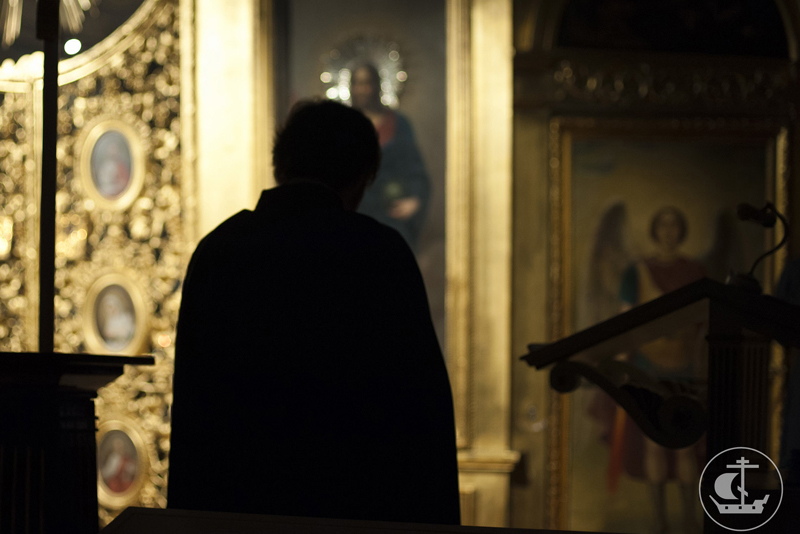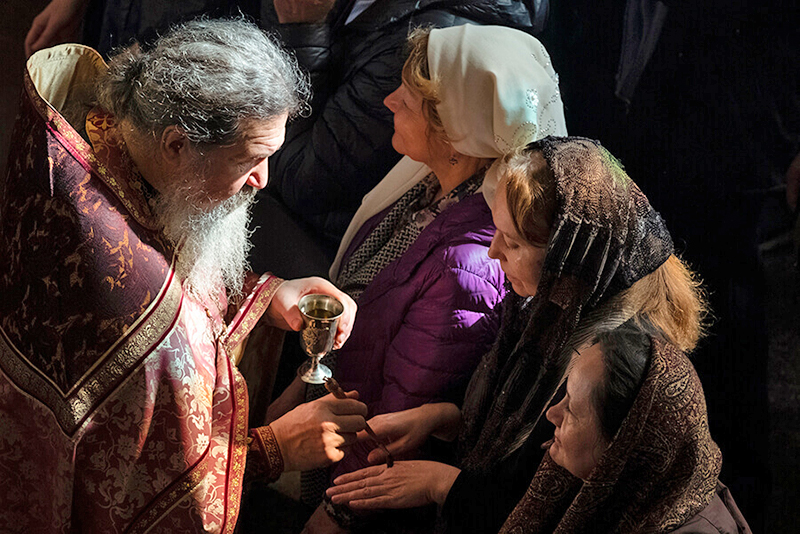
Every Sunday the Creed is said in Church in which Christians say the words, “I believe in one, holy, catholic, and apostolic church”. It many ways it is an odd thing to say. In the Creed we confess things that are matters of faith, things contestable, maybe even controversial. Thus we confess that God the Father almighty made the heaven and the earth, including all things visible (such as animals and men) and invisible (such as angels). This is not beyond dispute and many people manage to dispute it, believing either that the universe always existed or that it began without any help from God. It is similar with our confession of Jesus Christ as light from light, true God from true God, conceived by the Holy Spirit and born of the Virgin Mary, and raised from the dead three days after He died. This is a matter of faith, and so it finds its way into the Creed. But the Church? Surely the existence of the Church is hardly a matter of faith. We do not need faith to believe in the church—we can see churches all around us. Why is the Church in the Creed?
In fact, we often do not know the meaning of the words we are saying when we confess that we believe in one, holy, catholic, and apostolic church. Sometimes we mean by these words something not much more than “we believe in the existence of an institution which is very good and worthy of respect”. This is not quite what the Creed is getting at.
Let us look first at the term “church”—in Greek ekklesia. The word “church” is used in lots of ways. Most often the term refers to the building in which the Christians meet for worship. If I say, “I’ll meet you at the church at noon” I am obviously referring to the building used for Sunday services. Sometimes, in an earlier day, the term meant simply “the clergy”, so that if a young answered the question about what career he had chosen by saying, “I am going into the church”, he meant he was seeking ordination as a priest. More often by “the church” people mean “the Christians”, wherever they might meet for services. Often too by the term “the church” people mean an institution, as the Smithsonian is an institution or as the British Crown is an institution. I suspect that most people when they say the Creed mean something rather like this. When they confess belief in the Church, they mean to express loyalty to a venerable institution. The institution came into existence in the time of Jesus, and now has branches or spiritual franchises in many places, including the little congregation down the street.
In fact the church is not an institution, however many outward similarities to an institution it may possess. The term ekklesia (the Greek version of the Hebrew qahal) meant a gathering, an assembly. People assembled or gathered—that is, they left their homes to congregate in a particular place for a particular reason, and the result of all that individual assembling was an assembly. After they had gathered, they constituted a gathering. The assembly could be called for a number of purposes, either secular or religious. One could assemble to select a king, as Israel assembled to select King Saul (1 Samuel 10). One could assemble to prepare for war, as Israel did to wage war on the tribe of Benjamin (Judges 20). One could assemble for a religious convocation as Israel did when they repented before God at Mizpah (I Samuel 7). One could assemble to debate a civic problem, as the silver-smiths of Ephesus did when they met to protest against the work of St. Paul (Acts 19). This last example is particularly instructive: those who assembled were pagans, and men motivated mostly by financial concern, despite their loudly-professed civic devotion to Artemis of the Ephesians. Their assembly almost turned into a riot until the town clerk quieted the crowd and told them to go home. Then, as Luke reports, “When he said this, he dismissed the ekklesia”—i.e. the crowd which had gathered together. These men, pagans motivated by secular concerns at a town hall meeting, were an ekklesia—an assembly.
That is the word used in the New Testament to describe Christian liturgical experience. Individual Christians left their respective homes on Sunday to assemble and gather in a particular pre-arranged place. Having assembled, they were an assembly. Having gathered, they were a gathering. But not just any assembly or gathering—they were an assembly to which Christ pledged His presence. Whenever they assembled together to remember Him at the Eucharist, He promised that He would be in their midst, even if the assembly were so small that only two or three were there (Matthew 18:20). (The Greek of this last is interesting: Christ promises to be among them even if only two or three assemble—in Greek sunago/ συναγω–the same word used in the word “synagogue”, which was the word James used to describe the Christian assembly in James 2:2.) Christian assembly/ ekklesia is what happens after the Christians assemble. It is not so much an institution as an event. For at that assembly Christ manifests His presence as He promised He would. One can therefore refer to the ekklesia or church in the plural because Christians assembled in many assemblies throughout the world. One can also refer to the ekklesia or church in the singular, because wherever one went throughout the world one found the same Christ in every single assembly. The assembly in Thessalonica was the same as the assembly in Corinth because Christ was equally present in both. Christ’s presence made the different assemblies into one Assembly—one Church.
From this, three things follow.
First, one cannot consider oneself a part of the assembly unless one actually assembles, because that is what the word “assembly” means. Membership in the Ekklesia of God is not like membership in the Public Library. I am a member of the library in that I still have my library card, and it does not expire. I may not have set foot in the library for years, but the card still works. It is otherwise with the Church. If you didn’t assemble on Sunday, we were not a part of the assembly, and if you haven’t attended the Eucharist for years, you are no longer a part of the Church. It is easily remedied—to be a part of the assembly, just go next Sunday and assemble. (If it really has been years since you partook of the Eucharist, going to confession is also recommended.) The name “Christian” is the term for one who assembles regularly, and one forfeits the right to use the name if you never assemble.
Secondly, one should assemble on Sunday with the expectation of meeting Christ there. That is the whole reason for assembling. Valuable as sermons are, and uplifting as the choir sounds, one mostly assembles to meet the Lord and to be fed with His Body and Blood. We go in our brokenness to be healed, and in our filthiness to be washed clean. We assemble because the only one who can heal and cleanse is there and He has promised to do both for us if we come in penitence and faith.
Finally, if we plan on assembling on Sunday we must live in anticipation of this event on the six days previous. The priest will call us to the Chalice by saying the words, “The holy things for the holy!”—or, in another possible translation, “The sanctified things for the saints!” The usual New Testament term for a believer is the word “saint” [Greek agios], which is what we are. A saint is not a sinless person, but a person who belongs to God and who is striving to please Him, whatever his or her rate of success. It is as saints that we assemble, which is why the priest uses that term. As members of the Ekklesia and the Household of God we must strive to become what we are.



